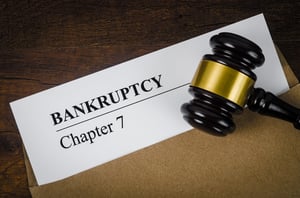 Filing a chapter 7 bankruptcy is a great way to provide needed financial relief for Minnesotans whom find themselves unable to manage their debts. In a chapter 7 bankruptcy case, the debtor (what you call a person whom files bankruptcy) receives a discharge within 3 to 4 months after filing their case, which eliminates the debtor’s legal liability to pay those debts forever.
Filing a chapter 7 bankruptcy is a great way to provide needed financial relief for Minnesotans whom find themselves unable to manage their debts. In a chapter 7 bankruptcy case, the debtor (what you call a person whom files bankruptcy) receives a discharge within 3 to 4 months after filing their case, which eliminates the debtor’s legal liability to pay those debts forever.
Even better, unlike in a chapter 13 3-to-5 year repayment plan, in a chapter 7, the debtor is not required to make any payments to the trustee in order to receive their discharge. The catch is that, in a chapter 7, the trustee may take any property of the debtor’s that is nonexempt, meaning not legally protected from being taken to pay debts. However, in most cases, the debtor has little-to-no such nonexempt property (most is exempt and protected), and the debtor can usually afford to pay a little bit to the trustee to keep their nonexempt property.
Chapter 7 bankruptcies are great for people who have a lot of debt and not a lot of property. However, in order to qualify to be able to file a chapter 7 bankruptcy case, the debtor must earn less than the median gross income, based on their family size, for the State of Minnesota. For example, the median household with just one person in Minnesota is currently $66,334 a year. For a household of two people the annual median income is $84,207 and for a household of 3 people the annual median income is $105,800.
The bankruptcy court first looks at the total gross household income that was received in the 6 months before a person files their bankruptcy test to determine if that person passes the “means test.” The means test is the measure by which the court examines the debtor’s income to determine whether they have the ability to make payments to their creditors in a chapter 13 bankruptcy case. When the debtor’s estimated gross income is less than the State median income, as calculated from their gross income during the 6 month period prior to filing their case, they pass the means test. This means, unless proven otherwise, the court goes ahead and assumes in this circumstance that the debtor has an insufficient amount of income to be forced to pay their creditors in a chapter 13 case. Likewise, when a debtor fails the means test by exceeding the State median income, as calculated based on the prior 6 month period, the court will presume the debtor earns enough money to be able to afford a chapter 13 repayment plan. If a debtor fails the means test, and still files a chapter 7 case, the court will presume that the debtor is “abusing” the bankruptcy court by filing for a chapter 7, when they can afford to be in a chapter 13. In such a case, the US Trustee will likely file a motion with the court alleging such abuse and requesting that the court either dismiss the debtor’s case or convert it into a chapter 13 case. If the debtor wishes to remain in a chapter 7 case, they will have to overcome the court’s presumption of abuse by showing that they are actually unable to make payments to their creditors. This can be quite difficult to do, as the court will closely scrutinize the debtor’s necessary monthly expenses in relation to their income to determine if they truly don’t have enough income to make even meager payments to their creditors in a chapter 13. This is not easy to do, but one example where the court may allow the debtor to remain in a chapter 7, would be if the debtor was making a lot of money in the 6 month period prior to filing, but suddenly suffered a permanent job loss before filing their chapter7 case.
There are a lot of considerations that must be made when determining whether one can, and should, file for a chapter 7 versus a chapter 13 bankruptcy. For this reason, a person considering filing for bankruptcy should first consult with an experienced bankruptcy attorney to make sure they file the right type of bankruptcy, and to ensure they receive the maximum amount of protection for their property once their case is filed. LifeBack Law Firm, PA, now has a new office location located at 370 Selby Ave., Suite 224, St. Paul, Minnesota 55102.
CALL NOW FOR A FREE STRATEGY SESSION FROM A MN BANKRUPTCY LAWYER AT LIFEBACK LAW FIRM
You can make an appointment to see us there, or to schedule a free phone consultation with one of our attorneys, by visiting our website at lifebacklaw.com!


